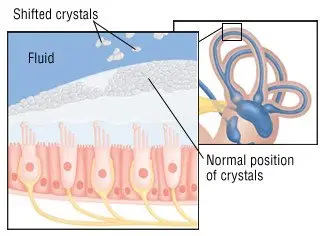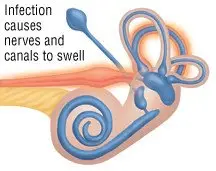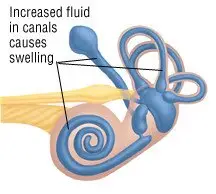What is Vertigo?

Vertigo is the sensation that either your body or your environment is moving (usually spinning). Vertigo can be a symptom of many different illnesses and disorders. The most common causes of vertigo are illnesses that affect the inner ear, including:
- Benign paroxysmal positional vertigo — In this condition, a change in head position causes a sudden sensation of spinning. The most likely cause is small crystals that break loose in the canals of the inner ear and touch the sensitive nerve endings inside.
|
|
- Acute labyrinthitis, also called vestibular neuritis — This is an inflammation of the balance apparatus of the inner ear, probably caused by a viral infection.
|
|
- Ménière's disease — This causes repeat episodes of dizziness, usually with ringing in the ear and progressive low-frequency hearing loss. Ménière's disease is caused by a change in the volume of fluid inside the inner ear. Although the reason for this change is unknown, scientists suspect that it may be linked to loud noise, to a viral infection or to biologic factors inside the ear itself.
|
|
Symptoms
Vertigo can feel like the room is spinning or like you are spinning in the room, or it can be just a sense of imbalance. It may be associated with nausea, vomiting and ringing in one or both ears (tinnitus).
Diagnosis
Your doctor will diagnose vertigo based on your description of what you are feeling. Vertigo can be divided into two major categories, peripheral vertigo and central vertigo.
Peripheral vertigo, which is much more common, includes benign positional vertigo, labyrinthitis and Ménière's disease. Positional vertigo is diagnosed when moving the head causes the vertigo and returning the head to a neutral position relieves symptoms. Labyrinthitis and Ménière's attacks usually come on abruptly and last from a few hours to a couple of days. There may be intense nausea and vomiting and variable hearing loss.
Central vertigo is a more serious problem in the cerebellum (back part of the brain) or brain stem.
Your doctor will evaluate your eye to look for abnormal jerking movements (nystagmus). The pattern of your eye movements may help to determine if the problem is peripheral or central. Usually, no further testing is needed unless your doctor suspects you have central vertigo. If central vertigo is suspected, your doctor will order a computed tomography (CT) scan or magnetic resonance imaging (MRI) of your brain.
Expected Duration
Depending on its cause, vertigo may last only a few seconds or last for weeks or months.
Prevention
Vertigo can happen to anyone, and there is no way to prevent the first episode. Because vertigo can be associated with an intense sense of imbalance, it is important to avoid situations in which a fall could cause significant harm, like climbing a ladder or working on a slanted roof.
Treatment
Your doctor may begin treatment by recommending bed rest or prescribing medications that suppress the activity of the inner ear, such as meclizine (Antivert, Bonine and other brand names), dimenhydrinate (Dramamine) or promethazine (Phenergan); anticholinergic medications such as scopolamine (Transderm-Sco); or a tranquilizer, such as diazepam (Valium). Depending on the cause and duration of the vertigo, additional advice may be offered.
For benign paroxysmal positional vertigo, your doctor may move your head and body through a series of positions. This is done in the office, usually on the examining table. The maneuvers move the tiny free floating crystals out of the sensing tube. The most commonly used method is the Epley maneuver. Your doctor also may provide specific maneuvers for you to continue at home.
For more persistent vertigo, your doctor may recommend other types of vestibular rehabilitation, also called balance rehabilitation. The types of exercises prescribed depend upon the underlying cause of dizziness and what movements provoke the symptoms. Your doctor may refer you to an audiologist and/or a physical therapist to help design and instruct your therapy.
Treatment options
The following list of medications are in some way related to or used in the treatment of this condition.
- meclizine
- Antivert
- Dramamine II
- Bonine
- Phenergan
View more treatment options
When To Call a Professional
Call your doctor if you have a new episode of vertigo, especially if it is associated with headache and significant coordination problems. Also call if you have mild vertigo that persists after a couple days.
Prognosis
Most cases of vertigo last a few hours to a few days. Symptoms caused by acute labyrinthitis almost always go away without permanent injury. Other causes of vertigo may result in symptoms that are more persistent.
Additional Info
National Institute on Deafness and Other Communication Disorders
http://www.nidcd.nih.gov/







